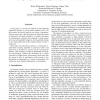22 search results - page 4 / 5 » Reinforcement Learning for Nash Equilibrium Generation |
GECCO
2006
Springer
13 years 9 months ago
2006
Springer
Two mathematical and two computational theories from the field of human and animal learning are combined to produce a more general theory of adaptive behavior. The cornerstone of ...
ATAL
2011
Springer
12 years 5 months ago
2011
Springer
The field of multiagent decision making is extending its tools from classical game theory by embracing reinforcement learning, statistical analysis, and opponent modeling. For ex...
ATAL
2007
Springer
13 years 12 months ago
2007
Springer
Distributed message relaying is an important function of a peer-topeer system to discover service providers. Existing search protocols in unstructured peer-to-peer systems either ...
SASO
2009
IEEE
14 years 15 days ago
2009
IEEE
In this paper, we present an analysis of self-organizing bandwidth sharing in priority-based medium access. For this purpose, the priority-based Access Game is introduced. Analysi...
JSAC
2007
13 years 5 months ago
2007
— One of the distinctive features in a wireless ad hoc network is lack of any central controller or single point of authority, in which each node/link then makes its own decision...

